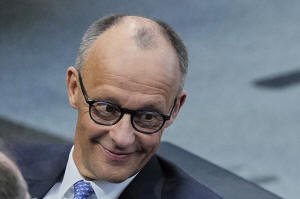Conservative leader Merz overcomes historic defeat to become Germany’s
chancellor
[May 07, 2025]
By STEFANIE DAZIO and KIRSTEN GRIESHABER
BERLIN (AP) — Conservative leader Friedrich Merz succeeded Tuesday in
becoming Germany’s next chancellor, drawing applause and a palpable
sense of relief in the parliament chamber after a historic loss in the
first round of voting threatened the new government's promises of
stability.
No other postwar candidate for German chancellor has failed to win on
the first ballot. The stunning but short-lived defeat sent shock waves
throughout Europe and dragged down the stock market. The DAX, the index
of major German companies, fell by 1.8% at one point.
The first round of voting, which was conducted by secret ballot, could
affect Merz's prospects for success and bring trouble to his coalition's
agenda, which includes reviving a stagnant economy and dealing with the
rise of the far-right, anti-immigrant Alternative for Germany party.
As the most populous member state of the 27-nation European Union and
the continent’s biggest economy, Germany is Europe's diplomatic and
economic heavyweight. Many had hoped Merz’s ascension would help the
continent navigate the war in Ukraine and the confrontational trade
policy of U.S. President Donald Trump.
“The whole of Europe, perhaps even the whole world, is watching this
second round of elections,” Jens Spahn, the head of the center-right
Union bloc in the German parliament, said before the final vote.
The aftermath
Merz had been expected to easily win the vote to become Germany’s 10th
chancellor since World War II, but the first ballot in the lower house
of parliament unexpectedly left him with 310 votes — well short of the
328 seats held by his coalition.

Hours later in the second round, he earned 325 votes, surpassing the 316
needed to pass in the 630-seat Bundestag.
Because the votes were cast secretly, it was not immediately clear — and
might never be — who defected from Merz’s camp.
Merz’s coalition is led by his center-right Christian Democratic Union
and its Bavarian sister party, the Christian Social Union. They are
joined by the center-left Social Democrats led by outgoing Chancellor
Olaf Scholz, who lost the national election in February.
Volker Resing, Merz's biographer, said Merz and his new ministers must
now focus on the day-to-day business of running the country.
“Tomorrow, this government must work, and it must make people forget how
it started," he told The Associated Press. “It must now show that it can
get the economy going again. ... It must show that it can get illegal
migration under control, and it must show that there is leadership again
in Europe, especially in light of the threat from the east.”
Merz did not directly address his first-round loss Tuesday evening in
his first speech after being sworn in, saying only that he was grateful
to be elected “in the second round of voting.”
“So here we go. I am looking forward to the new task, and I am looking
forward to working with you all in this house in a spirit of trust,” he
said.
80th anniversary of World War II
Tuesday's voting came on the eve of the 80th anniversary of Nazi
Germany’s unconditional surrender in World War II. The ballots were cast
in the restored Reichstag building, where graffiti left by victorious
Soviet troops has been preserved at several locations.
The shadow of the war in Ukraine also loomed over the vote. Germany is
the second-biggest supplier of military aid to Ukraine, after the United
States.
Ukraine’s President Volodymyr Zelenskyy said Tuesday that he seeks more
European and transatlantic leadership from Germany following Merz’s win.
[to top of second column]
|

Friedrich Merz waits for the beginning of a session where he is
supposed to be elected new Chancellor in the German federal
parliament, Bundestag, at the Reichstag building in Berlin, Tuesday,
May 6, 2025. (AP Photo/Ebrahim Noroozi)

“Ukraine is deeply grateful for the support of Germany and its
people," Zelenskyy wrote on social platform X. "Your helping hand
has saved thousands and thousands of Ukrainian lives.”
Overall, Germany is the fourth-largest defense spender in the world,
according to the Stockholm International Peace Research Institute,
which studies trends in global military expenditures. Only the U.S.,
China and Russia are ahead.
Germany rose to that rank thanks to an investment of 100 billion
euros ($107 billion) for its armed forces, a measure passed by
lawmakers in 2022.
Defense spending rose again earlier this year, when parliament
loosened the nation’s strict debt rules. The move has been closely
watched by the rest of Europe as the Trump administration has
threatened to pull back from its security commitment to the
continent.
Germany and the Trump administration
The U.S. administration has bashed Germany repeatedly since Trump’s
inauguration in January. Trump, who has German roots, often
expressed his dislike of former Chancellor Angela Merkel during his
first term.
This time around, Trump’s lieutenants are at the forefront — tech
billionaire and Trump ally Elon Musk has supported AfD for months.
He hosted a chat with co-leader Alice Weidel that he livestreamed on
X earlier this year to amplify her party’s message.
AfD is the biggest opposition party in Germany’s new parliament
after it placed second in February’s elections. Despite its historic
gains, it was shut out of coalition talks due to the so-called
“firewall” that mainstream German political parties have upheld
against cooperating with far-right parties since the end of the war.
Vice President JD Vance, during the Munich Security Conference in
February, assailed the creation of the firewall and later met with
Weidel, a move that German officials heavily criticized.
Last week, the German domestic intelligence service said it has
classified AfD as a “right-wing extremist” organization, making it
subject to greater and broader surveillance.

The decision by the Federal Office for the Protection of the
Constitution prompted blowback from U.S. Secretary of State Marco
Rubio and Vance over the weekend. Germany’s Foreign Ministry hit
back at Rubio after he called on the country to drop the
classification.
The domestic intelligence service’s measure does not amount to a ban
of the party, which can only be imposed through a request by either
of parliament’s two chambers or by the federal government through
the Federal Constitutional Court.
Merz has not commented publicly on the intelligence service’s
decision.
___
Associated Press writer David Keyton and videojournalist Fanny
Brodersen in Berlin and writer David McHugh in Frankfurt, Germany,
contributed to this report.
All contents © copyright 2025 Associated Press. All rights reserved |